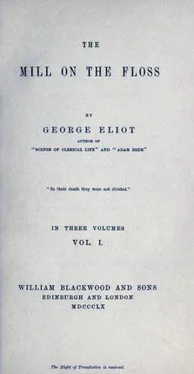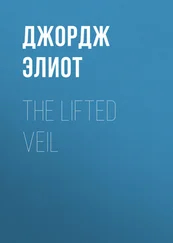"Bless me! what have you here?" said Wakem, startled by a sudden transition from landscape to portrait. "I thought you'd left off figures. Who are these?"
"They are the same person," said Philip, with calm promptness, "at different ages."
"And what person?" said Wakem, sharply fixing his eyes with a growing look of suspicion on the larger picture.
"Miss Tulliver. The small one is something like what she was when I was at school with her brother at King's Lorton; the larger one is not quite so good a likeness of what she was when I came from abroad."
Wakem turned round fiercely, with a flushed face, letting his eye-glass fall, and looking at his son with a savage expression for a moment, as if he was ready to strike that daring feebleness from the stool. But he threw himself into the armchair again, and thrust his hands into his trouser-pockets, still looking angrily at his son, however. Philip did not return the look, but sat quietly watching the point of his pencil.
"And do you mean to say, then, that you have had any acquaintance with her since you came from abroad?" said Wakem, at last, with that vain effort which rage always makes to throw as much punishment as it desires to inflict into words and tones, since blows are forbidden.
"Yes; I saw a great deal of her for a whole year before her father's death. We met often in that thicket — the Red Deeps — near Dorlcote Mill. I love her dearly; I shall never love any other woman. I have thought of her ever since she was a little girl."
"Go on, sir! And you have corresponded with her all this while?"
"No. I never told her I loved her till just before we parted, and she promised her brother not to see me again or to correspond with me. I am not sure that she loves me or would consent to marry me. But if she would consent, — if she did love me well enough, — I should marry her."
"And this is the return you make me for all the indulgences I've heaped on you?" said Wakem, getting white, and beginning to tremble under an enraged sense of impotence before Philip's calm defiance and concentration of purpose.
"No, father," said Philip, looking up at him for the first time; "I don't regard it as a return. You have been an indulgent father to me; but I have always felt that it was because you had an affectionate wish to give me as much happiness as my unfortunate lot would admit, not that it was a debt you expected me to pay by sacrificing all my chances of happiness to satisfy feelings of yours which I can never share."
"I think most sons would share their father's feelings in this case," said Wakem, bitterly. "The girl's father was an ignorant mad brute, who was within an inch of murdering me. The whole town knows it. And the brother is just as insolent, only in a cooler way. He forbade her seeing you, you say; he'll break every bone in your body, for your greater happiness, if you don't take care. But you seem to have made up your mind; you have counted the consequences, I suppose. Of course you are independent of me; you can marry this girl to-morrow, if you like; you are a man of five-and-twenty, — you can go your way, and I can go mine. We need have no more to do with each other."
Wakem rose and walked toward the door, but something held him back, and instead of leaving the room, he walked up and down it. Philip was slow to reply, and when he spoke, his tone had a more incisive quietness and clearness than ever.
"No; I can't marry Miss Tulliver, even if she would have me, if I have only my own resources to maintain her with. I have been brought up to no profession. I can't offer her poverty as well as deformity."
"Ah, there is a reason for your clinging to me, doubtless," said Wakem, still bitterly, though Philip's last words had given him a pang; they had stirred a feeling which had been a habit for a quarter of a century. He threw himself into the chair again.
"I expected all this," said Philip. "I know these scenes are often happening between father and son. If I were like other men of my age, I might answer your angry words by still angrier; we might part; I should marry the woman I love, and have a chance of being as happy as the rest. But if it will be a satisfaction to you to annihilate the very object of everything you've done for me, you have an advantage over most fathers; you can completely deprive me of the only thing that would make my life worth having."
Philip paused, but his father was silent.
"You know best what satisfaction you would have, beyond that of gratifying a ridiculous rancor worthy only of wandering savages."
"Ridiculous rancor!" Wakem burst out. "What do you mean? Damn it! is a man to be horsewhipped by a boor and love him for it? Besides, there's that cold, proud devil of a son, who said a word to me I shall not forget when we had the settling. He would be as pleasant a mark for a bullet as I know, if he were worth the expense."
"I don't mean your resentment toward them," said Philip, who had his reasons for some sympathy with this view of Tom, "though a feeling of revenge is not worth much, that you should care to keep it. I mean your extending the enmity to a helpless girl, who has too much sense and goodness to share their narrow prejudices. She has never entered into the family quarrels."
"What does that signify? We don't ask what a woman does; we ask whom she belongs to. It's altogether a degrading thing to you, to think of marrying old Tulliver's daughter."
For the first time in the dialogue, Philip lost some of his self-control, and colored with anger.
"Miss Tulliver," he said, with bitter incisiveness, "has the only grounds of rank that anything but vulgar folly can suppose to belong to the middle class; she is thoroughly refined, and her friends, whatever else they may be, are respected for irreproachable honor and integrity. All St. Ogg's, I fancy, would pronounce her to be more than my equal."
Wakem darted a glance of fierce question at his son; but Philip was not looking at him, and with a certain penitent consciousness went on, in a few moments, as if in amplification of his last words,–
"Find a single person in St. Ogg's who will not tell you that a beautiful creature like her would be throwing herself away on a pitiable object like me."
"Not she!" said Wakem, rising again, and forgetting everything else in a burst of resentful pride, half fatherly, half personal. "It would be a deuced fine match for her. It's all stuff about an accidental deformity, when a girl's really attached to a man."
"But girls are not apt to get attached under those circumstances," said Philip.
"Well, then," said Wakem, rather brutally, trying to recover his previous position, "if she doesn't care for you, you might have spared yourself the trouble of talking to me about her, and you might have spared me the trouble of refusing my consent to what was never likely to happen."
Wakem strode to the door, and without looking round again, banged it after him.
Philip was not without confidence that his father would be ultimately wrought upon as he had expected, by what had passed; but the scene had jarred upon his nerves, which were as sensitive as a woman's. He determined not to go down to dinner; he couldn't meet his father again that day. It was Wakem's habit, when he had no company at home, to go out in the evening, often as early as half-past seven; and as it was far on in the afternoon now, Philip locked up his room and went out for a long ramble, thinking he would not return until his father was out of the house again. He got into a boat, and went down the river to a favorite village, where he dined, and lingered till it was late enough for him to return. He had never had any sort of quarrel with his father before, and had a sickening fear that this contest, just begun, might go on for weeks; and what might not happen in that time? He would not allow himself to define what that involuntary question meant. But if he could once be in the position of Maggie's accepted, acknowledged lover, there would be less room for vague dread. He went up to his painting-room again, and threw himself with a sense of fatigue into the armchair, looking round absently at the views of water and rock that were ranged around, till he fell into a doze, in which he fancied Maggie was slipping down a glistening, green, slimy channel of a waterfall, and he was looking on helpless, till he was awakened by what seemed a sudden, awful crash.
Читать дальше












